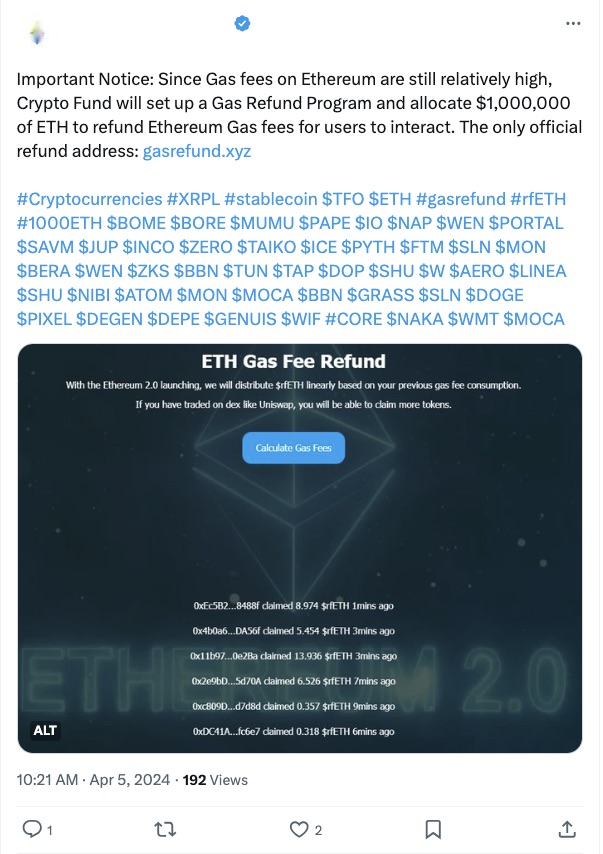Ethereum Gas Refunds: Can You Actually Get Your Fees Back?

Ads about getting a refund of Ethereum transaction fees are widespread on Twitter/X. Even if you’re following a few crypto-related pages on the platform, chances are high you’ve seen such ads too. Posts about possible refunds started to appear after the Ethereum Merge upgrade, and are still very common.
In September 2022, Ethereum moved from the Proof-of-Work consensus algorithm to Proof-of-Stake. Many websites and pages appeared spreading an attractive message that after the upgrade, Ethereum offers users refunds for the fees they had spent over the last 2 years. There are accounts claiming they’ve got thousands of dollars back.



Source: twitter.com
At first sight, these posts may seem legit as they include a link to the official Ethereum website (ethereum.org). However, if you click on it, you will be redirected to a completely different website, often starting with "ethgases", "gasrefund", or a similar domain. It can be easy to fall into the trap but don’t hurry to connect your crypto wallet to the website. Unfortunately, these posts are nothing but scams: by connecting your wallet, you may end up losing your funds. ETH refund posts use a typical phishing attack mechanism, leading users to a fraudulent website and tricking them into providing sensitive information, in this case, the details of their crypto wallets.

Source: twitter.com
Does Ethereum Offer Refunds for the Spent Gas Fees?
The Ethereum Network doesn’t offer full refunds for gas fees spent on confirmed transactions. A user may get a part of the fee back when there's unused gas after the transaction happens. In this case, the remaining amount is returned.
Here, it’s important to understand what the concept of gas is. When a user sends a transaction request, Ethereum network participants, called validators, confirm it and add it to the blockchain.
Validators provide computation to the network and ensure the secure processing of requests. Users pay transaction fees, from which validators get rewards for their contribution to the network. Gas is the measure in which the computational effort is calculated.
After the transaction is added to the chain, it’s irreversible, which means the gas fee spent to process the transaction is non-refundable. That’s one of the special characteristics of blockchain technology.
Although there are strategies to minimize gas fees, and receive a portion back in case of extra gas, it’s unreal to get fees spent on confirmed transactions back.
Sometimes, transactions fail or get reverted; validators may not pick up a request if it offers too low a gas fee. In that case, you can drop the request by sending a second transaction with higher gas and with the same nonce (a unique number included in each transaction to ensure its order). On the Ethereum explorer Etherscan, you can see the nonce by clicking on the pending transaction, scrolling down, and selecting more details. If the first transaction hasn’t been confirmed yet, it can be replaced by the second transaction, potentially allowing you to recover the coins. Otherwise, even if the transaction fails because it runs out of gas, the network charges a fee for the computational use. Using Etherscan and other blockchain explorers, you can view the history of your transactions, check their status, observe gas fees, and access other details.
Recognizing Ethereum Gas Refund Scams
No new and innovative projects can promise to return the funds users have spent on confirmed Ethereum transactions. Gas fee refund ads on social media are total scams that everyone needs to avoid. One way to spot a scam is by the unrealistic returns it promises. Another method is to pay attention to the author of the post and the legitimacy of the website they promote. Extremely attractive arbitrage, get-rich-quick, and other posts are usually scams designed to enrich only the promoters.



